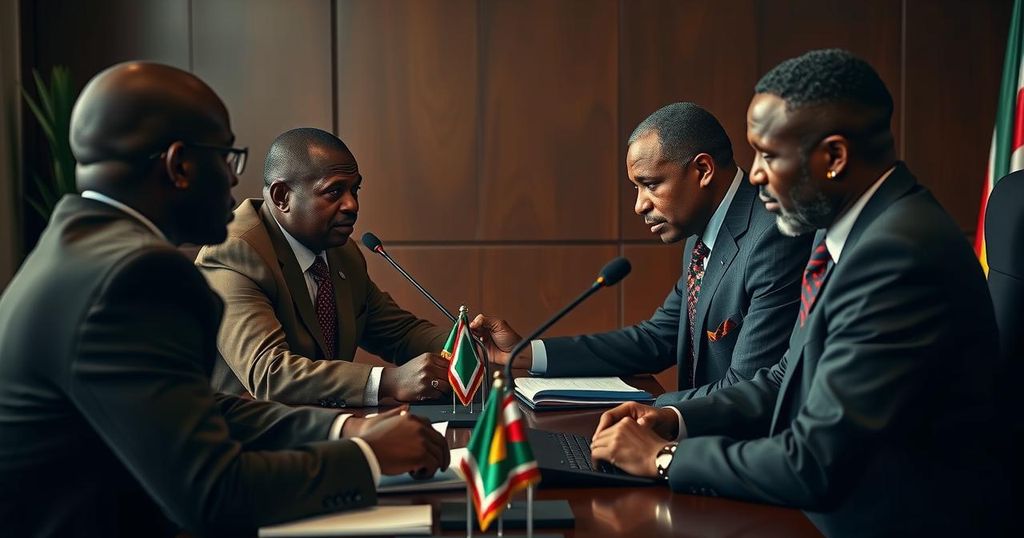South Sudan’s holdout groups have agreed to resume peace talks in Nairobi following security concerns and dissatisfaction with the negotiation process. This decision follows discussions facilitated by Kenyan President William Ruto in Juba. The Tumaini Initiative aims to mediate outstanding issues and include non-signatories in the peace agreement process, emphasizing the importance of regional support for stabilizing South Sudan.
South Sudan’s holdout factions, which have not signed the 2018 peace agreement, have consented to recommence peace negotiations in Nairobi following prolonged expressions of security concerns and discontent with the negotiation process. This breakthrough emerged after Kenyan President William Ruto’s discussions in Juba with critical figures including President Salva Kiir and First Vice President Riek Machar. President Ruto confirmed that the parties involved agreed to continue mediation efforts aimed at resolving outstanding issues. The peace negotiations, referred to as the Tumaini Initiative, originally commenced in May after discussions where President Kiir sought President Ruto’s assistance in facilitating dialogue. The ongoing process will now incorporate the participation of the Intergovernmental Authority on Development (Igad), which was the original mediator of the 2018 peace accord, formally known as the Revitalised Agreement on the Resolution of the Conflict in South Sudan. Kenya holds the view that Igad’s involvement will enhance regional backing for the new dialogue, aiming to include those factions that have yet to sign the peace agreement. The prospect of peace and stability is crucial for the economic recovery of not only South Sudan but the surrounding region. In earlier communications from State House in Nairobi, it was indicated that discussions would center around establishing a foundation for enduring peace through the Tumaini Initiative. It was noted that significant progress has been achieved through rigorous discussions with prominent stakeholders from South Sudan, thereby fostering a robust groundwork for sustainable peace initiatives. President Ruto has identified Lt-Gen (Rtd) Lazarus Sumbeiywo and Mohamed Guyo as mediators to facilitate dialogue between the Kiir-led Transitional Government of National Unity and the holdout groups. Although the Tumaini Initiative faced challenges with Juba withdrawing its delegation for consultations, consensus has emerged on six out of the nine protocols addressing reconciliation, justice, power-sharing, and long-term state rebuilding efforts. Lt-Gen Sumbeiywo, previously instrumental in mediating for the 2005 Sudan Comprehensive Peace Agreement that ultimately led to South Sudan’s independence in 2011, remarked that the involved parties recognized that adopting a new constitution would serve as a preventive measure against future conflicts. Nonetheless, the coalition government in Juba recently announced an extension of its governance mandate by two years, set to commence in February, after failing to prepare for the originally scheduled elections in December. Nairobi reports that a significant number of previously hesitant holdout groups appear to have shifted towards accepting the Kenyan-led mediation effort, with some even dispatching observers to the talks. It is noteworthy that certain factions are implicated in the violent unrest that affects cross-border trade with Kenya and Uganda, underscoring the broader regional implications of the conflict.
The conflict in South Sudan has persisted since gaining independence from Sudan in 2011, with various factions vying for power and influence. A peace agreement was initially signed in 2018; however, several groups did not sign and have since expressed concerns over the peace process’s execution. Efforts have been made by regional actors, such as Kenya, to bring these groups into the fold to foster a more inclusive path towards stability and recovery for South Sudan and the surrounding region.
In summary, the acceptance by South Sudan’s holdout groups to resume peace talks in Nairobi signals a promising development towards resolving the prolonged conflict in the region. The involvement of Kenyan leadership and the Igad is deemed crucial in this mediation process, which aims to address the outstanding issues that hamper the peace agreement’s success. Continued dialogue, commitment from involved parties, and the establishment of a new constitutional framework may pave the way for lasting peace and economic recovery in South Sudan.
Original Source: www.theeastafrican.co.ke






